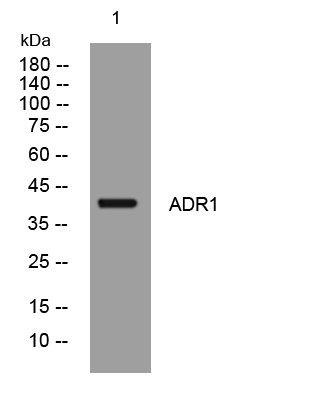- Home
- About
- Promotions
-
Products
-
Elisa Kits
- |
-
Primary antibodies
- |
-
Secondary antibodies
- |
-
Proteins
- |
-
IHC reagents
- |
-
WB reagents
- PonceauS Staining Solution
- PBST Washing Buffer, 10X
- 1.5M Tris-HCl Buffer, pH8.8
- 1M Tris-HCl Buffer, pH6.8
- 10% SDS Solution
- Prestained Protein Marker
- TBST Washing Buffer, 10X
- SDS PAGE Loading Buffer, 5X
- Stripping Buffered Solution
- Tris Buffer, pH7.4, 10X
- Total Protein Extraction Kit
- Running Buffer, 10X
- Transfer Buffer, 10X
- 30% Acr-Bis(29:1) Solution
- Tris电泳液速溶颗粒
- PBS(1X, premixed powder)
- TBS(1X, premixed powder)
- 快速封闭液
- 转膜液速溶颗粒
- Chemical reagents
- News
- Distributor
- Resources
- Contact
- Home
- >
- Info
- >
- ADR1 rabbit pAb
- >
- Go Back
ADR1 rabbit pAb
- Catalog No.:YT6316
- Applications:WB
- Reactivity:Human;Mouse
- Fields:
- >>AMPK signaling pathway;>>Longevity regulating pathway;>>Adipocytokine signaling pathway;>>Non-alcoholic fatty liver disease;>>Alcoholic liver disease
- Gene Name:
- ADIPOR1 PAQR1 TESBP1A CGI-45
- Immunogen:
- Synthesized peptide derived from human ADR1 AA range: 277-327
- Specificity:
- This antibody detects endogenous levels of ADR1 at Human/Mouse
- Formulation:
- Liquid in PBS containing 50% glycerol, 0.5% BSA and 0.02% sodium azide.
- Source:
- Polyclonal, Rabbit,IgG
- Purification:
- The antibody was affinity-purified from rabbit antiserum by affinity-chromatography using epitope-specific immunogen.
- Storage Stability:
- -15°C to -25°C/1 year(Do not lower than -25°C)
- Molecular Weight(Da):
- 41kD
- Background:
- This gene encodes a protein which acts as a receptor for adiponectin, a hormone secreted by adipocytes which regulates fatty acid catabolism and glucose levels. Binding of adiponectin to the encoded protein results in activation of an AMP-activated kinase signaling pathway which affects levels of fatty acid oxidation and insulin sensitivity. A pseudogene of this gene is located on chromosome 14. Multiple alternatively spliced transcript variants have been found for this gene. [provided by RefSeq, Mar 2014],
- Function:
- function:Receptor for globular and full-length adiponectin (APM1), an essential hormone secreted by adipocytes that acts as an antidiabetic. Probably involved in metabolic pathways that regulate lipid metabolism such as fatty acid oxidation. Mediates increased AMPK, PPARA ligand activity, fatty acid oxidation and glucose uptake by adiponectin. Has some high-affinity receptor for globular adiponectin but low-affinity receptor for full-length adiponectin.,similarity:Belongs to the ADIPOR family.,subcellular location:Localized to the cell membrane and intracellular organelles.,subunit:May form homo and heteromultimers.,tissue specificity:Widely expressed. Highly expressed in skeletal muscle. Expressed at intermediate level in brain, heart, spleen, kidney, liver, placenta, lung and peripheral blood leukocytes. Weakly expressed in colon, thymus and small intestine.,
- Subcellular Location:
- Cell membrane ; Multi-pass membrane protein . Localized to the cell membrane and intracellular organelles. .
- Expression:
- Widely expressed (PubMed:16044242). Highly expressed in heart and skeletal muscle (PubMed:12802337). Expressed at intermediate level in brain, spleen, kidney, liver, placenta, lung and peripheral blood leukocytes (PubMed:12802337). Weakly expressed in colon, thymus and small intestine (PubMed:12802337).

- Western blot analysis of lysates from AD293 cells, primary antibody was diluted at 1:1000, 4°over night




